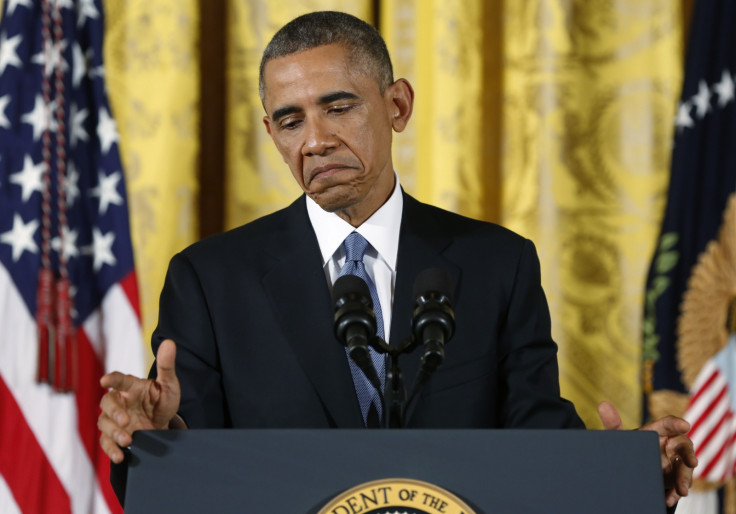US Midterm Elections 2014: Why It's All About Money and Show Business but Not Change

Sheepishly claiming victory by the narrowest of margins in the Virginia Senate race, Democratic Senator Mark Warner decried an end to electoral politics driven by sound bites.
Not that the Senator himself avoided the sound bite game; it probably seemed to his handlers that attacking sound bites created the perfect sound bite. They must be right; I am paraphrasing his words.
With some few exceptions, the press loves sound bites. Soundbites are like an executive summary; a pithy statement meant to encompass some substantive thought, plan, or analysis.
And why read the analysis or plan when you can just quote the sound bite?
Asking the Hard Questions
There was an era when reporters routinely read the small print, pounded the halls of government and asked hard questions. Today, those journalists are few and far between.
One substitute for substance is news that summarises information from the readers themselves. This is what they call "polls." Leading up to elections, the press loves to report poll results.
Why?
Because, treating politics like a sporting event with winners and losers is easy and because hiring some bean counting firm to call people up and ask them what they are thinking is probably cheaper than investigative reporting which generates stories with some meaning.
The story line in the US is that Americans tossed the bums out because they are tired of gridlock.
Yet, I wonder whether many Americans – other than being able to repeat the word "gridlock" -- can identify any specifics about this gridlock thing. How could they?
The press is so busy talking about gridlock; they have little time to talk about what is actually gridlocked.
And then there are "the colours." Yes colours! You heard me.
There was a time where we talked about sectors of the country as being more conservative or liberal or prone to vote Democratic or Republican.
Of course those were just labels too. Now it is worse; the press talks in color schemes as in "Red" and "Blue."
Election Night
It is sometimes hard to tell whether I am watching the news or Project Runway.
We sometimes forget that Election night on American TV is just show business and there needs to be a colour scheme for the "visuals." It looks pretty.
For their part, candidates are no help either.
Leading up to the campaign many voters were inundated with candidate emails. Some had variations of the following message like "it's the candidate's birthday and celebrate by donating $5, $10, $25 or more to the campaign." Really? Do I care! (Notice the exclamation point and not the question mark)
And then there is the old stand by which goes something like: "a big Political Action Committee is spending millions to defeat me so please help me by donating $5, $10, $25 or more to the campaign."
What Do Candidates Stand For?

At the end of the day it is hard to discern what any candidate truly stands for except a strong desire to collect money.
By all accounts, this mid-term election was the most costly in US history. One hundred million dollars alone was spent on the North Carolina Senate race.
That's enough money to buy personal tutors for every child in the state of North Carolina who cannot read.
Rather than clamouring over who is going be the "education Senator," candidates might just open their campaign coffers and redirect money – otherwise spent on ads, mailers, hucksters, handlers, flacks and donuts – and use it to teach kids to read.
While all this seems quite amusing; it really is not. We have entered an era where our regulators lack the resources to enforce compliance on a global scale.
Laws which contemplated an economy defined by geographic boundaries face new challenges. How do environmental laws designed to regulate hazardous substances from cradle to grave work when the hazardous substance is born over-seas?
Our federal courts are understaffed with judicial slots not filled and appointments made with an eye to the optics of who will receive easy confirmation rather than who has the innate ability and qualifications to be a fair and otherwise outstanding judge.
While the press clamours over who likes and dislikes "Obama Care," little attention is given to the $60bn that is drained from the healthcare system as a result of fraud and abuse.
No focus is given to the band of private contractors that are now performing inherently governmental functions, helping to write regulations, and being paid monies to monitor for their own miss-spending. (By the way, it is no surprise that these same contractors are at the heart of the electoral money spend.)
There are of course the constant challenges of foreign policy; challenges that threaten the Republic and the safety of its citizens.
With all this going on, candidates spend their time reminding us of their birthdays and their need to collect money? Sounds kinda nuts! Right?
So here is a thought; maybe Americans tossed the bums out because they are just tired of it all.
Reuben Guttman, heads the international whistleblower practice and runs the Washington, DC office of the law firm of Grant & Eisenhofer . He is a Senior Fellow and Adjunct Professor at the Emory University School of Law Center for Advocacy and Dispute Resolution and has taught for the Centre in China and Mexico. He is a founder of the website whistleblowerlaws.com.
© Copyright IBTimes 2025. All rights reserved.





















